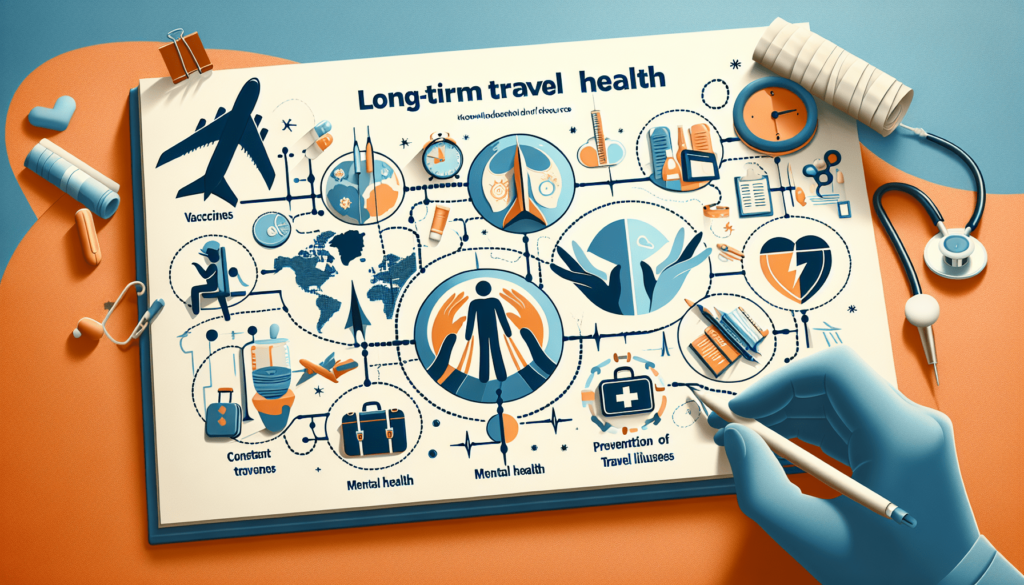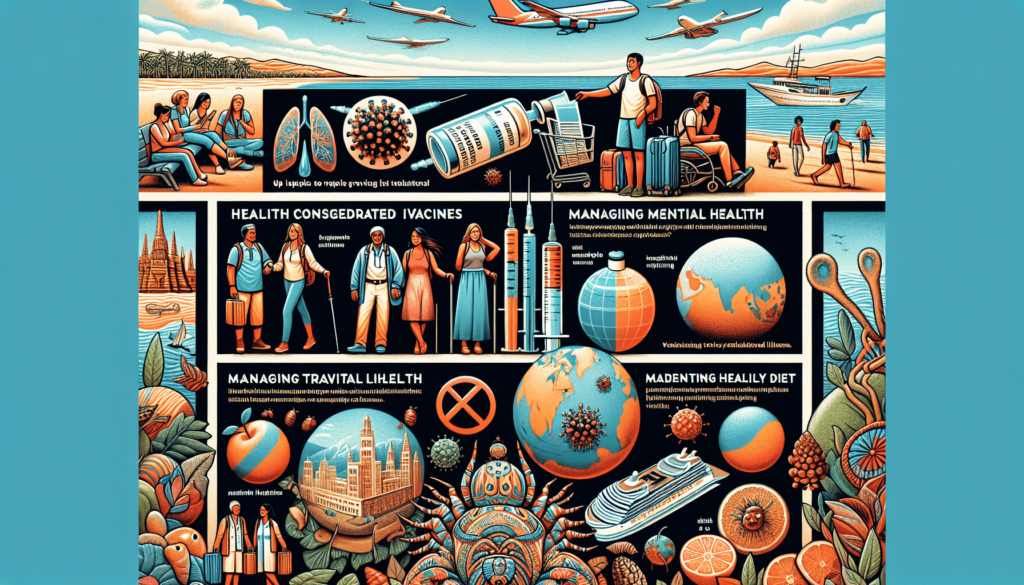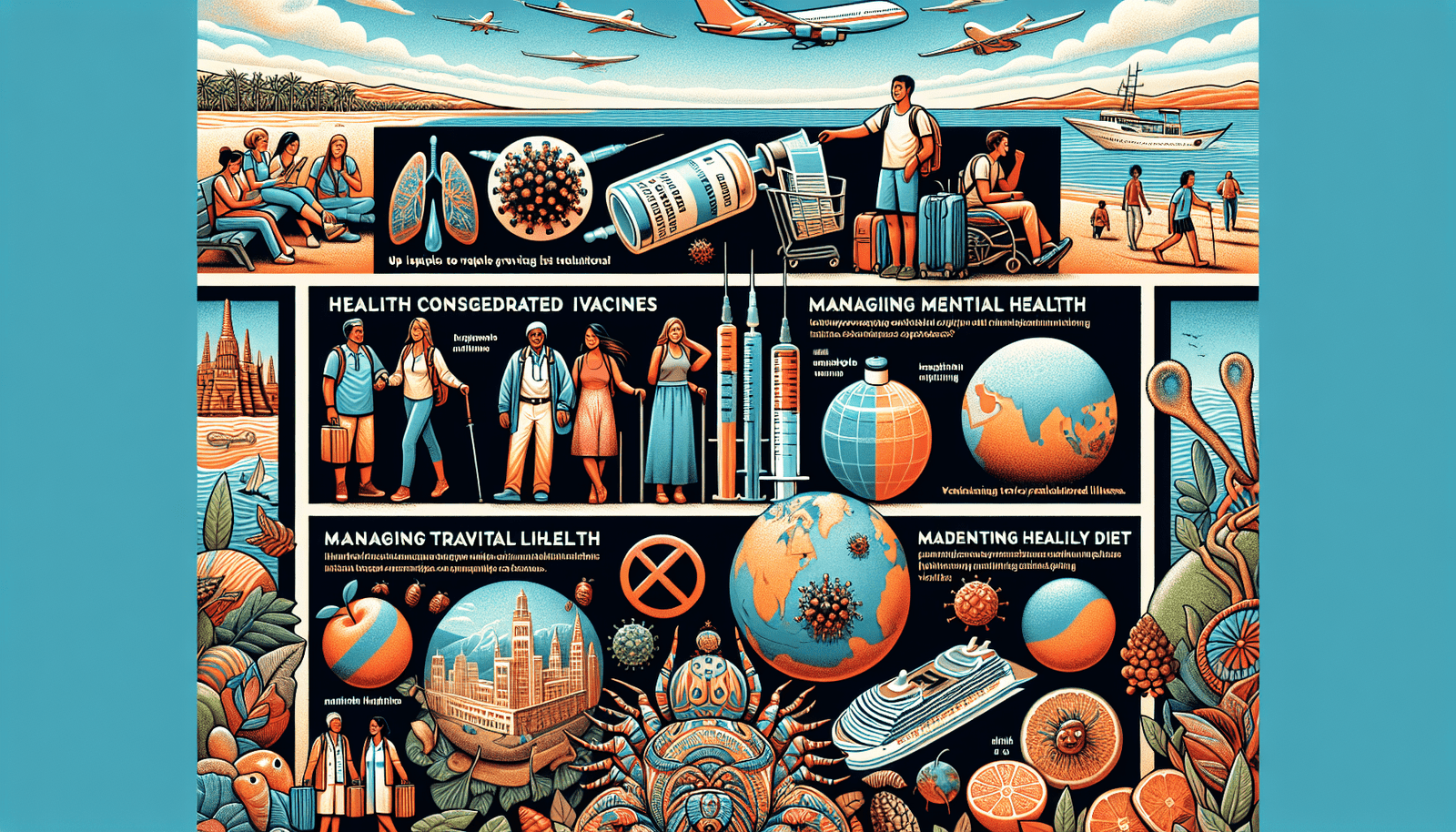Are you embarking on a long-term journey and eager to explore the wonders of the world? As you set off on this exciting path, it’s essential to take a moment to consider the potential health implications of your adventure. Whether it’s jet lag, managing chronic conditions, or encountering unfamiliar diseases, being mindful of your health is paramount. In this article, we will explore the various health considerations for long-term travelers, equipping you with valuable insights and practical tips to ensure a safe and memorable journey.

Vaccinations
Researching necessary vaccinations
Before embarking on a long-term journey, it is crucial to research and understand the necessary vaccinations for the destinations you plan to visit. Different countries have different health risks, and getting vaccinated can prevent the onset of preventable diseases. Consult with your healthcare provider or visit a travel clinic to get detailed information about the required vaccinations. They will review your medical history, travel itinerary, and recommend the appropriate vaccines based on your destination and personal health.
Updating routine vaccinations
While researching necessary vaccinations, it is also important to ensure that your routine immunizations are up to date. Routine vaccinations, such as the ones for measles, mumps, rubella, diphtheria, tetanus, and pertussis, should be checked and updated if needed. These vaccinations not only protect you but also prevent the spread of diseases to vulnerable populations. Make sure to consult with your healthcare provider to verify if your routine vaccinations need updating.
Discussing travel-specific vaccinations with a healthcare provider
In addition to routine vaccinations, some destinations may require travel-specific vaccinations to protect against region-specific diseases. For example, certain countries may have a higher risk of diseases like yellow fever, typhoid, or Japanese encephalitis. Your healthcare provider or travel clinic will guide you on which additional vaccinations may be necessary based on your travel plans, duration, and specific activities you’ll engage in. By discussing travel-specific vaccinations with a healthcare provider, you can ensure you are adequately protected against potential health risks.
Health insurance
Ensuring adequate health insurance coverage
When you are embarking on a long-term journey, it is essential to have adequate health insurance coverage to protect yourself in case of any unforeseen medical emergencies. While researching health insurance options, consider coverage for medical expenses, emergency medical evacuation, and repatriation of remains, as these may be necessary in a foreign country. Ensure that your insurance covers the duration of your trip and provides adequate protection for the activities you plan to engage in.
Reviewing policy terms and coverage limits
Before finalizing your health insurance, carefully review the policy terms and coverage limits to fully understand the extent of coverage provided. Pay attention to any exclusions, deductibles, or limitations that may apply. It is essential to have a clear understanding of what expenses are covered and any documentation needed to file claims. If you have any questions or concerns, don’t hesitate to reach out to the insurance provider for clarification.
Considering additional travel insurance for medical emergencies
While health insurance is crucial, it may be worthwhile to consider additional travel insurance specifically tailored for medical emergencies. This type of insurance can provide additional coverage that may not be included in regular health insurance plans, such as emergency dental care, emergency transportation, or trip interruption coverage. Depending on your travel plans and personal preferences, it may be beneficial to purchase travel insurance to provide extra peace of mind during your journey.
Medications
Checking medication availability in destination countries
If you depend on certain medications, it’s important to ensure that they are available in the countries you will be visiting. Research each destination’s regulations regarding medication importation and availability. Some medications may have different brand names or may not be readily available, so it is crucial to plan accordingly. Contact local embassies or consulates if you have any questions or concerns about specific medication availability.
Obtaining necessary prescriptions and documentation
Before traveling, make sure you have the necessary prescriptions and documentation for any medications you need to take with you. Some countries may require travelers to carry a copy of the prescription or a doctor’s note explaining the need for the medication. It’s always better to be prepared and have the required documentation to prevent any issues at customs or border control.
Carrying extra medication and copies of prescriptions
To be prepared for unexpected circumstances, it is advisable to carry an ample supply of your medication for the duration of your trip. Additionally, keep copies of your prescriptions and any pertinent medical information in case you need to refill medications or see a healthcare professional while abroad. This will help ensure that you have access to your necessary medications and can easily communicate your needs to local healthcare providers if required.
Emergency medical care
Researching healthcare facilities and emergency services in each destination
Before you depart on your long-term journey, it is essential to research the healthcare facilities and emergency services available in each of your destinations. Familiarize yourself with the locations of hospitals, clinics, and emergency centers. Understanding the proximity and quality of healthcare facilities can help you make informed decisions in case of any medical emergencies during your travels.
Knowing how to access medical help in different locations
In addition to researching healthcare facilities, it is vital to know how to access medical help in different locations. Inquire about the local emergency numbers and healthcare helplines that are available. Take note of any language barriers and consider carrying a translation card or smartphone app that can assist in communicating your medical needs to healthcare providers in different languages.
Understanding local healthcare systems and their quality
Each country has its own healthcare system, and their quality and accessibility can vary. When traveling long-term, it is valuable to have a basic understanding of the local healthcare system in each destination. This knowledge can help you navigate the system more effectively and make informed decisions about the care you receive. Researching the availability of English-speaking healthcare providers or medical facilities accustomed to treating international patients is also beneficial.

Food and water safety
Staying cautious with food and water choices
One of the critical considerations for long-term travelers is food and water safety. To avoid illnesses caused by contaminated food or water, it is important to stay cautious with your choices. Opt for food that is freshly cooked and served hot. Avoid raw or undercooked foods, street vendor meals, and unpeeled fruits or vegetables that may have been washed in untreated water. Additionally, be mindful of the water you consume and opt for bottled or filtered water to reduce the risk of waterborne infections.
Avoiding unsafe street food and tap water
While exploring new destinations, it can be tempting to indulge in street food experiences. However, exercise caution and avoid unsafe street food that may not have been prepared under sanitary conditions. Also, refrain from consuming tap water, ice cubes, or beverages made with tap water unless it has been properly filtered or boiled. Even a small slip in food and water safety can lead to severe gastrointestinal illnesses and disrupt your travel plans.
Practicing good hygiene and using safe drinking water sources
Practicing good hygiene is crucial for preventing food and waterborne illnesses during your long-term travels. Wash your hands thoroughly with soap and clean water before eating or handling food. Use hand sanitizers when soap and water are not available. Additionally, ensure that the drinking water you consume comes from a reliable and safe source, such as bottled water or water that has been adequately treated and filtered.
Mosquito-borne illnesses
Understanding the risk of mosquito-borne diseases in different regions
Different regions carry varying risks of mosquito-borne diseases such as dengue fever, malaria, or Zika virus. Research the destinations you plan to visit to understand the prevalence of these diseases and take appropriate preventive measures. Some areas may have peak seasons for certain illnesses, so it is essential to be aware and take necessary precautions accordingly.
Using insect repellent and wearing protective clothing
To minimize the risk of mosquito bites and subsequent infections, use insect repellents containing DEET, picaridin, or other recommended active ingredients. Apply the repellent to exposed skin and clothing as directed by the product instructions. Additionally, wear long sleeves, pants, and shoes when in mosquito-prone areas, especially during dawn and dusk, when mosquitoes are most active.
Taking prophylaxis for malaria if necessary
In regions where malaria is prevalent, it may be necessary to take prophylactic medications to prevent the disease. Consult with your healthcare provider or visit a travel clinic to discuss the need for malaria prophylaxis based on your travel itinerary and personal health. Remember to take the medications as directed and continue taking them after leaving high-risk areas, as instructed, to ensure full protection.
Traveler’s diarrhea
Following food and water safety guidelines
One of the most common health issues encountered by travelers is traveler’s diarrhea. To prevent this unpleasant condition, it’s crucial to follow food and water safety guidelines. Be cautious with the food you consume, especially in areas with limited sanitation. Avoid tap water, ice cubes, and uncooked or undercooked foods. Stick to restaurants with good hygiene practices and choose cooked foods served piping hot.
Carrying over-the-counter medications for diarrhea
Despite taking precautions, traveler’s diarrhea can still occur. It is wise to carry over-the-counter medications specifically for diarrhea to alleviate symptoms and help you recover more quickly. Your healthcare provider can recommend suitable options and dosage instructions based on your individual needs. Remember to read and follow the instructions on the medication packaging.
Seeking medical help if symptoms persist
In most cases, traveler’s diarrhea will resolve on its own within a few days. However, if the symptoms persist or worsen, it is essential to seek medical help. Dehydration can be a significant concern, especially in hot climates, so it’s crucial to replenish fluids and electrolytes. Medical professionals can provide appropriate treatment and advice based on your specific situation, ensuring a more comfortable and safe travel experience.
Mental health
Managing stress and loneliness during long-term travel
Long-term travel can sometimes bring moments of stress and loneliness. It’s important to prioritize your mental well-being during the journey. Find ways to manage stress, such as practicing mindfulness, engaging in activities you enjoy, or journaling your experiences. Regularly staying in touch with loved ones back home can also help combat feelings of loneliness and keep you connected.
Taking breaks and practicing self-care
Traveling can be physically and mentally demanding, so taking breaks and practicing self-care is crucial. Listen to your body and mind, and don’t hesitate to take some downtime when needed. This can include activities like reading a book, taking a leisurely walk, or enjoying a spa day. Prioritizing self-care will help you maintain a positive mental state throughout your long-term journey.
Seeking support from fellow travelers or professionals if needed
If you find yourself struggling with your mental health while traveling, don’t hesitate to seek support. Reach out to fellow travelers for social connections and shared experiences. Sometimes having someone to talk to who understands your situation can make a significant difference. If needed, consider seeking professional help from therapists or psychologists who specialize in supporting travelers or facilitating online counseling sessions.
Physical fitness
Staying active and engaging in regular physical activity
While traveling long-term, it’s important to prioritize physical fitness. Incorporate regular physical activity into your daily routine to boost your overall health and well-being. Explore the surroundings on foot or by bike, go for hikes, or participate in local fitness classes. Staying active not only helps maintain physical fitness but also increases energy levels and enhances your travel experience.
Adapting exercise routines to different environments
When you encounter different environments during your journey, adapt your exercise routines accordingly. If you don’t have access to a gym or fitness facilities, focus on bodyweight exercises that can be done anywhere, like squats, lunges, push-ups, or yoga. Utilize the natural surroundings for activities such as swimming, hiking, or even dancing. The key is to remain flexible and find creative ways to keep moving.
Being aware of altitude-related illnesses in high-altitude destinations
If your travel plans include high-altitude destinations, it’s essential to be aware of altitude-related illnesses such as acute mountain sickness (AMS), high-altitude pulmonary edema (HAPE), and high-altitude cerebral edema (HACE). These conditions can occur when ascending to high altitudes too quickly. Take time to acclimatize by gradually ascending and listening to your body. If you experience severe symptoms like difficulty breathing or severe headaches, seek medical attention immediately.
Safety precautions
Researching destination-specific safety concerns
While planning your long-term journey, research destination-specific safety concerns and take appropriate precautions. Familiarize yourself with common scams, areas known for theft, or any political or social unrest that may affect your safety. Stay updated on travel advisories and consider registering with your embassy or consulate for safety alerts and assistance.
Taking precautions against theft and scams
To protect yourself and your belongings from theft and scams, it is important to take precautions. Be vigilant in crowded areas, keep valuable items secure, and avoid displaying signs of wealth. Consider using anti-theft devices for your luggage and wallets, and be cautious when providing your personal information or credit card details. By being proactive and mindful of your surroundings, you can minimize the risk of becoming a target for theft or scams.
Knowing emergency contact numbers in each location
Before arriving at each destination, familiarize yourself with the emergency contact numbers, such as local police, ambulance services, and your embassy or consulate. Store these numbers in your phone or carry them with you at all times. Being prepared with the necessary contact information will help you swiftly seek assistance in case of emergencies or if you require immediate help.
Long-term travel can be an incredibly enriching experience, but it’s essential to prioritize your health and safety throughout the journey. By researching necessary vaccinations, ensuring adequate health insurance coverage, practicing food and water safety, taking precautions against illnesses, and being aware of your surroundings, you can minimize potential health risks and enjoy a memorable and safe travel experience. Remember to consult with healthcare professionals, stay informed, and be prepared for any situation that may arise during your adventure. Safe travels!

